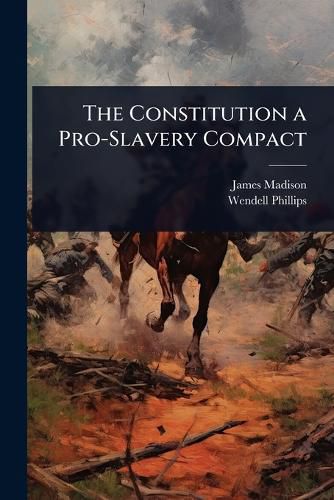Readings Newsletter
Become a Readings Member to make your shopping experience even easier.
Sign in or sign up for free!
You’re not far away from qualifying for FREE standard shipping within Australia
You’ve qualified for FREE standard shipping within Australia
The cart is loading…






This title is printed to order. This book may have been self-published. If so, we cannot guarantee the quality of the content. In the main most books will have gone through the editing process however some may not. We therefore suggest that you be aware of this before ordering this book. If in doubt check either the author or publisher’s details as we are unable to accept any returns unless they are faulty. Please contact us if you have any questions.
"The Constitution a Pro-Slavery Compact" presents excerpts from the Madison Papers and other historical documents to argue that the United States Constitution was fundamentally designed to protect and perpetuate the institution of slavery. Published in 1856, this work reflects the passionate abolitionist sentiments of the time, challenging the prevailing interpretations of the Constitution and its relationship to human bondage.
Wendell Phillips, a prominent abolitionist, likely compiled and introduced these extracts to bolster the argument against slavery. By highlighting the compromises made during the drafting of the Constitution, particularly those addressing the representation of enslaved people and the fugitive slave clause, the text aims to expose what it argues is the inherent pro-slavery bias within the nation's founding document. This work serves as a historical artifact of the debates surrounding slavery and its impact on American political and social thought during the lead-up to the Civil War. Its enduring value lies in its critical perspective on constitutional history and its contribution to the abolitionist cause.
This work has been selected by scholars as being culturally important, and is part of the knowledge base of civilization as we know it. This work was reproduced from the original artifact, and remains as true to the original work as possible. Therefore, you will see the original copyright references, library stamps (as most of these works have been housed in our most important libraries around the world), and other notations in the work.
This work is in the public domain in the United States of America, and possibly other nations. Within the United States, you may freely copy and distribute this work, as no entity (individual or corporate) has a copyright on the body of the work.
As a reproduction of a historical artifact, this work may contain missing or blurred pages, poor pictures, errant marks, etc. Scholars believe, and we concur, that this work is important enough to be preserved, reproduced, and made generally available to the public. We appreciate your support of the preservation process, and thank you for being an important part of keeping this knowledge alive and relevant.
$9.00 standard shipping within Australia
FREE standard shipping within Australia for orders over $100.00
Express & International shipping calculated at checkout
This title is printed to order. This book may have been self-published. If so, we cannot guarantee the quality of the content. In the main most books will have gone through the editing process however some may not. We therefore suggest that you be aware of this before ordering this book. If in doubt check either the author or publisher’s details as we are unable to accept any returns unless they are faulty. Please contact us if you have any questions.
"The Constitution a Pro-Slavery Compact" presents excerpts from the Madison Papers and other historical documents to argue that the United States Constitution was fundamentally designed to protect and perpetuate the institution of slavery. Published in 1856, this work reflects the passionate abolitionist sentiments of the time, challenging the prevailing interpretations of the Constitution and its relationship to human bondage.
Wendell Phillips, a prominent abolitionist, likely compiled and introduced these extracts to bolster the argument against slavery. By highlighting the compromises made during the drafting of the Constitution, particularly those addressing the representation of enslaved people and the fugitive slave clause, the text aims to expose what it argues is the inherent pro-slavery bias within the nation's founding document. This work serves as a historical artifact of the debates surrounding slavery and its impact on American political and social thought during the lead-up to the Civil War. Its enduring value lies in its critical perspective on constitutional history and its contribution to the abolitionist cause.
This work has been selected by scholars as being culturally important, and is part of the knowledge base of civilization as we know it. This work was reproduced from the original artifact, and remains as true to the original work as possible. Therefore, you will see the original copyright references, library stamps (as most of these works have been housed in our most important libraries around the world), and other notations in the work.
This work is in the public domain in the United States of America, and possibly other nations. Within the United States, you may freely copy and distribute this work, as no entity (individual or corporate) has a copyright on the body of the work.
As a reproduction of a historical artifact, this work may contain missing or blurred pages, poor pictures, errant marks, etc. Scholars believe, and we concur, that this work is important enough to be preserved, reproduced, and made generally available to the public. We appreciate your support of the preservation process, and thank you for being an important part of keeping this knowledge alive and relevant.